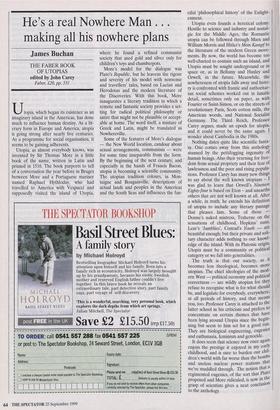He's a real Nowhere Man . . .
making all his nowhere plans
James Buchan
THE FABER BOOK OF UTOPIAS edited by John Carey Faber, £20, pp. 531 Utopia, which began its existence as an imaginary island in the Americas, has done much to influence human destiny. As a lit- erary form in Europe and America, utopia is going strong after nearly five centuries. As a programme for social organisation, it seems to be gaining adherents.
Utopia, as almost everybody knows, was invented by Sir Thomas More in a little book of the name, written in Latin and printed in 1516. The book purports to tell of a conversation the year before in Bruges between More and a Portuguese mariner named Raphael Hythloday, who had travelled to America with Vespucci and supposedly visited the island of Utopia, where he found a refined communist society that used gold and silver only for children's toys and chamberpots.
More's model for the dialogue was Plato's Republic, but he leavens the rigour and severity of his model with nonsense and travellers' tales, based on Lucian and Herodotus and the modern literature of the Discoveries. With this book, More inaugurates a literary tradition in which a remote and fantastic society provides a set- ting for radical political philosophy or satire that might not be plausible or accept- able at home. The word itself, a mixture of Greek and Latin, might be translated as Nowhereville.
Some of the features of More's dialogue — the New World location, candour about sexual arrangements, communism — were for some time inseparable from the form. By the beginning of the next century, and especially in the hands of Francis Bacon, utopia is becoming a scientific community. The utopian tradition colours, in Mon- taigne and Bougainville, descriptions of actual lands and peoples in the Americas and the South Seas and influences the fan- ciful 'philosophical history' of the Enlight- enment.
Utopia even founds a heretical colony. Hostile to science and industry and nostal- gic for the Middle Ages, the Romantic utopia can be followed through Marx and William Morris and Hitler's Mein Kampf to the literature of the modern Green move- ments. By now, the world has become too well-charted to contain such an island, and Utopia must be sought underground or in space or, as in Bellamy and Huxley and Orwell, in the future. Meanwhile, the nowhereness of utopia falls away and histo- ry is confronted with frantic and authoritar- ian social schemes worked out in lunatic detail, sometimes only on paper, as with Fourier or Saint-Simon, or on the streets of revolutionary Paris, Scots cotton Mills, the American woods, and National Socialist Germany. The Third Reich, Professor Carey argues, made an epoch for utopia, and it could never be the same again. I wonder about Cambodia in the 1980s.
Nothing dates quite like scientific fanta- sy. One comes away from this anthology stunned by the pettifogging ingenuity of human beings. Also their yearning for free- dom from sexual propriety and their fear of lawlessness and the poor and rising popula- tions. Professor Carey has many new things to say about the well known utopians - I was glad to learn that Orwell's Nineteen Eighty-four is based on Eton - and unearths others that are not well known at all. After a while, in truth, he extends his definition of utopia to include any literary passage that pleases him. Some of those — Donne's naked mistress, Traheme on the sensations of childhood, Hopkins' nuns, Lear's `Jumblies', Conrad's Youth — are beautiful enough; but their private and soli- tary character adds nothing to our knowl- edge of the island. With its Platonic origin, Utopia must be a community or political category or we fall into generalities. The truth is that our society, as it becomes less theological, becomes more utopian. The chief ideologies of the mod- ern West — political economy and political correctness — are wildly utopian for they refuse to recognise what is for what should be, and legislate for everybody, everywhere, at all periods of history, and that means you, too. Professor Carey is attached to the latter school in his criticism and prefers to concentrate on certain themes that have been lying around Utopia since the begin- ning but seem to him set for a good run. They are biological engineering, eugenics and euthanasia, feminism and genocide. It does seem that science now once again enjoys the prestige it enjoyed in my early childhood, and is sure to burden our chil- dren's world with far worse than the bombs and useless nuclear power stations that we've muddled through. The notion that a regimented eugenics, of the sort that Plato proposed and More ridiculed, is now in the grasp of scientists gives a neat conclusion to the anthology.


























































































 Previous page
Previous page